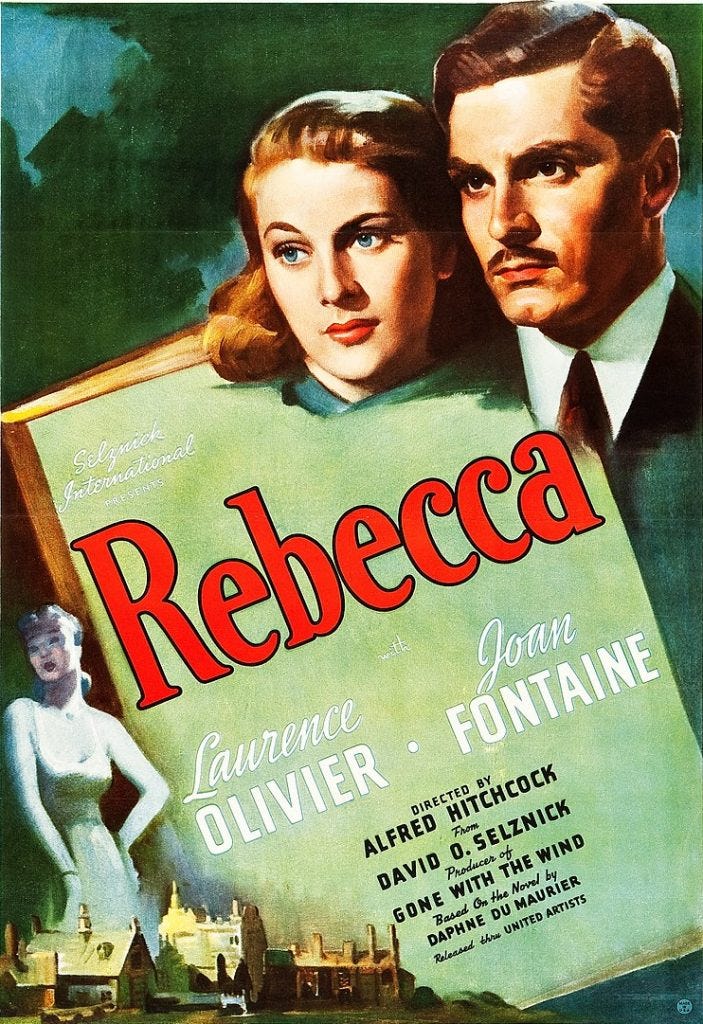Rebecca: Chapters 1-7
"What must I have seemed like after Rebecca?”
Hello readers!
Welcome to October and our group reading of Daphne du Maurier’s Rebecca. I read it for the first time a handful of years ago and immediately loved it. The vibes were a mix of Jane Eyre (there are some very obvious connections to that incredible novel), Rules of Civility, and even some Haunting of Hill House. It’s gothic, brooding, mysterious . . . and just beautifully written.
Through seven chapters, the writing itself is even better than I remembered from that first reading. Du Maurier’s conveyance of tension is masterful and her ability to slowly reveal details and threads of the story — while even giving us some pretty big hints about where we’re going — is done as effectively as anything I’ve read.
Let’s dig in just a bit more, going chapter by chapter.
And of course, I’d love to hear what you think so far.
Chapter 1
“Last night I dreamt I went to Manderley again.”
What a memorable first line. It has stuck with me ever since I first encountered it. Right away, we know we’re dealing with memory and even some unreliability — anything dealing in dreams is never quite for certain.
Here at the start, we don’t anything. We’re just dropped into this opaque scene about this big estate that’s “secretive and silent,” with wild shrubs described as “bastard things.” The house is almost more of a character at this point than even our narrator:
“I could swear that the house was not an empty shell but lived and breathed it had lived before.”
“The house was a sepulchre, our fear and suffering lay buried in the ruins.”
“Ruins” there is rather interesting isn’t it — we’re given a hint of what’s to come. Something momentous has happened, but we have no clue what it even relates to. We’re totally in the dark at this point, which makes us want to keep turning the pages.
Chapter 2
“We can never go back again, that much is certain.”
We keep getting these hints of some major event . . . a “he” is even introduced as being “wonderfully patient” — but we don’t know who “he” is just yet. The characters of Danvers and Rebecca (our title character) are brought up, but with no detail or context. Again, some detail about the house:
“Manderley is no more. It lies like an empty shell amidst the tangle of the deep woods.”
What is happening in this story? What has happened here? At this point we’re clueless, but if you’re like me, utterly drawn in. The writing is luscious and makes me want to keep going, right along with the story itself:
“I suppose sooner or later in the life of everyone comes a moment of trial. We all of us have our particular devil who rides us and torments us, and we must give battle in the end.”
We start to learn just a little bit about our narrator — that she used to be timid, but not quite so much anymore (writing from the future):
“I have lost my diffidence, my timidity, my shyness with strangers. I am very different from that self who drove to Manderley for the first time.”
Finally, we get a direct question:
“What must I have seemed like after Rebecca?”
Okay, so it’s a story of comparison. Interesting!
Mrs. Van Hopper is introduced and reveals a bit more:
“It’s Max de Winter . . . He looks ill, doesn’t he? They say he can’t get over his wife’s death. . . .”
Now we’re getting somewhere!
Keep reading with a 7-day free trial
Subscribe to The Big Read to keep reading this post and get 7 days of free access to the full post archives.


